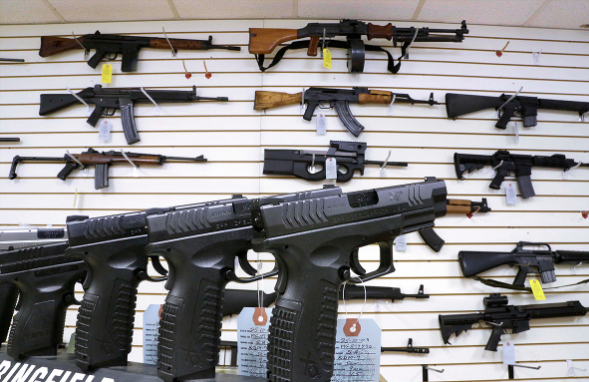
El Salvador's congress has approved emergency powers that suspend constitutional freedoms and ease arrest rules for 30 days to battle a record wave of gang-related killings that forced business closures and the postponement of public events.
The measures, which were requested by President Nayib Bukele on Saturday, March 26, and passed by legislators the following day, enforce restrictions on free gathering, relax arrest rules and grant the blocking of communications. (Related: NYPD to increase weekend patrols after sudden increase in crime citywide.)
Police reported that there had been 62 murders on Saturday, making it the most violent 24-hour period in the country since the end of the 1992 civil war.
The new laws restrict the right to come together, permit arrests without a warrant and the inspection of communications.
Gang-plagued El Salvador recorded 1,140 murders in 2021
The gang-plagued nation recorded 1,140 murders last year, which was actually a 30-year low. Nevertheless, that still corresponds to 18 murdered individuals per 100,000 inhabitants. Last November, another series of violence led to more than 40 people being killed within three days.
Hours before El Salvador's congress voted on the new powers, which will stay in place for 30 days, four leaders of the Mara Salvatrucha (MS-13) gang had been arrested over the series of killings, according to police.
"We have had a new spike in homicides, something that we had worked so hard to reduce. While we fight criminals in the streets, we must try to figure out what is happening and who is financing this," said Bukele, elected in 2019 on promises to fight organized crime and improve security in the Central American nation.
The country "must let the agents and soldiers do their job and must defend them from the accusations of those who protect the gang members," added Bukele in a statement tweeted by Congress President Ernesto Castro.
Juan Pappier of the international campaign group Human Rights Watch tweeted that the measures were "very worrying, especially in a country where there are no independent democratic institutions."
The MS-13 and Barrio-18 gangs, among others, have about 70,000 members and are accountable for homicides, extortion and drug trafficking, according to authorities.
Police said the newest bloodshed had left 12 people dead in La Libertad, including nine each in San Salvador and Ahuachapan, with the other killings spread around the Latin American country.
In April 2020, as the coronavirus swept through the country, Bukele enforced a 24/7 lockdown for imprisoned gang members after more than 50 people were killed in three days.
Bukele argued that many of the murders were ordered from behind bars and said prisoners belonging to rival gangs would be made to share cells in a bid to break up lines of communication. In the past weekend, he wrote in his social media accounts that he was ordering the head of the country's prisons to execute a 24/7 lockdown of gang inmates in their cells.
"They are not to go out even to the patio" of prisons, Bukele said, adding: "A message to the gangs: because of your actions, now your homeboys will not see even one ray of sunlight."
US claims Bukele's government in cahoots with gang leaders
While Bukele appeared to be tough on criminals, the conservative Arena Party hinted that he was actually protecting them. "We must remind the people of El Salvador that what is happening now is due to the negligence of those who protected criminals," the party said in a statement.
This was an obvious reference to a December report by the United States Department of the Treasury claiming that Bukele's government privately negotiated a truce with gang leaders. That belied denials made by Bukele and increased tensions between the two countries.
The U.S. accused Bukele's administration of buying the gangs' support with financial benefits and privileges for their imprisoned leaders, including prostitutes and cell phones.
The explosive allegations ripped to the heart of one of Bukele's most highly accepted successes in office, which is a drop in the country's homicide rate.
"Cell phones and prostitutes in the prisons? Money to the gangs? When did that happen? Didn't they even check the date? How can they put out such an obvious lie without anyone questioning them?" said Bukele via Twitter in response to the accusations.
Bukele fiercely denied the allegation when it was reported by the local news site El Faro in August 2020.
The U.S. Treasury said in a statement that in 2020, Bukele's government "provided financial incentives to Salvadoran gangs MS-13 and 18th Street Gang (Barrio 18) to ensure that incidents of gang violence and the number of confirmed homicides remained low" and "over the course of these negotiations with Luna and Marroquin, gang leadership also agreed to provide political support to the Nuevas Ideas political party in upcoming elections."
Follow Violence.news for more stories like this.
Watch the video below about violence in America.
This video is from the Son of the Republic channel on Brighteon.com.
More related stories:
Beverly Hills residents arm themselves and form self-defense groups to counter rising violence.
SHOCK VIDEO: Black mob targets White kids for vicious gang beatdown in Ocean City, Md.
Murder rates across U.S. soared in 2021 to record levels amid engineered collapse of society.
Sources include:
Please contact us for more information.




















